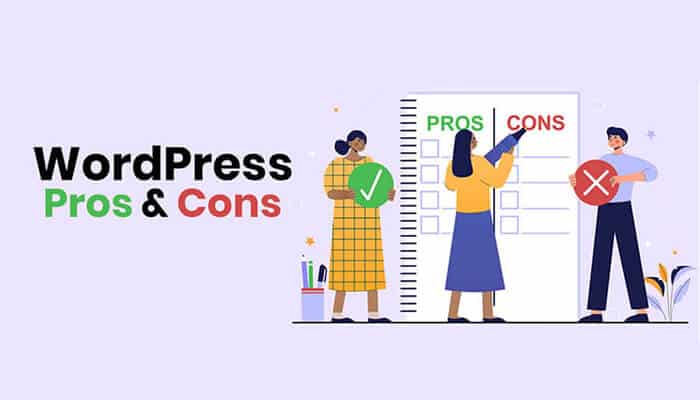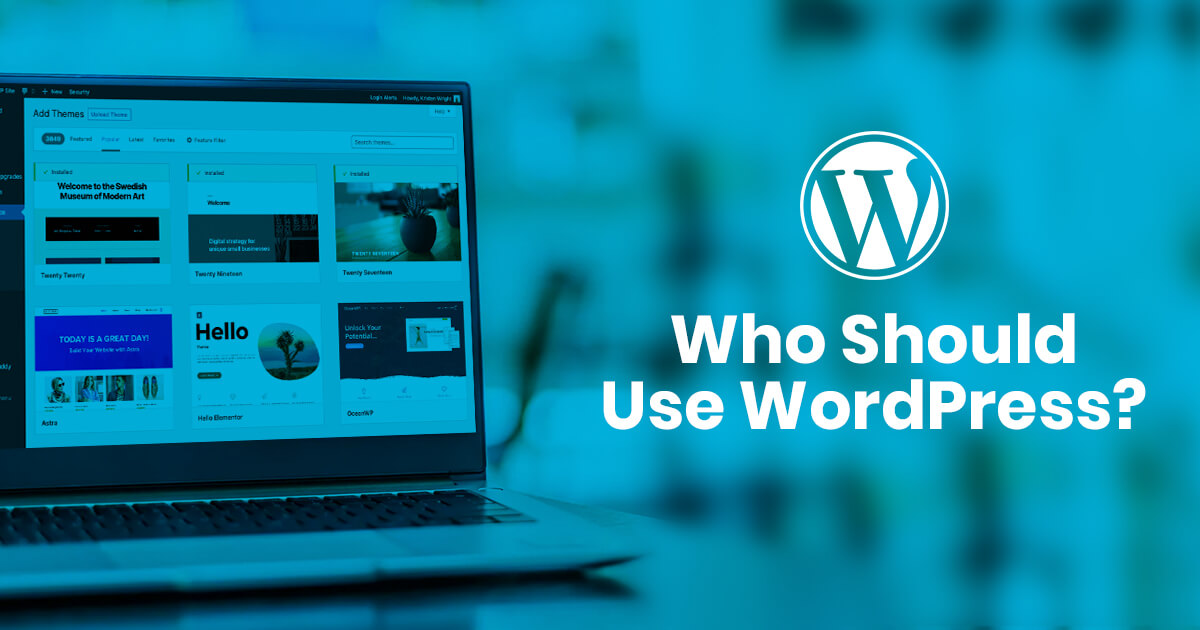When we talk about website building, WordPress is the first name that comes to our mind. It’s a free website building platform, which is quite popular because it is easy-to-use, and understanding the overall functionality of WordPress isn’t rocket science for sure. Let’s discuss a few major pros and cons of WordPress, so you can understand whether you should opt for it or not.
What Is WordPress?
The core of this website development platform is to help users create and manage blogs and websites. The fact that it is free and easy-to-access, makes it perfect for both businesses and individuals. In fact, as of now, 43% of total websites that are live on the Internet are powered by WordPress. On average, one in every four websites that we visit was built on this platform.
What Is WordPress’s Best feature?
This open-source content management system was licensed under GPLv2, so anyone can use and modify this software for free. The best part of using this platform is that you don’t need to know anything about programming. You don’t really need to be a developer to use it.
How Does WordPress Work?
Making a WordPress website is quite easy because unlike other website building platforms, it keeps content, functionality and design separate as sections, which facilitates data portability. In simple words, you can add your content irrespective of the design template that you opted for. Anyone can alter the design of their WordPress website without changing content, and can even add new features without disturbing other parts.
When you create a website using WordPress, you can store data like images in separate folders in media files. You can do so by using WordPress block editor, which is quite uncomplicated and even beginners can use it to edit as well as style content. Additional features can be explored with the aid of WordPress plugins.
Design on a WordPress website can be managed with the aid of a powerful templating engine that allows developers to create sets of different templates that are known as themes. In WordPress website development, you have the choice to select from an embedded suite of premade themes that have separate basic template files and stylesheets for various sections of the website. The available settings can help developers easily customize their websites.
Related Reading: How and Where to Outsource Your WordPress Development Work
What Kind of Websites Can You Make With WordPress?
WordPress is used for creating the following types of websites:
- Blogs
- E-commerce WordPress Websites
- Online Community
- Portfolio Websites
- Knowledge-Driven Websites
- Multilingual Website
- Digital Magazines
- SaaS (Software As A Service) Websites
- Online Affiliate Stores
- Multisite Network
What Are Some Good WordPress Alternatives?
Following are a few of the major alternatives for WordPress:
- Shopify
- Wix
- Drupal
- Ghost
- Squarespace
Who Should Use WordPress?
Anyone who wants to build a website from scratch can use it. WordPress website development doesn’t require any sort of expertise, which is why the platform’s user base isn’t limited by factors like skill level. Yes, there are a couple of things that you need to acquaint yourself with before you start working on the development tasks. However, anyone with minimum to negligible technical knowledge can get around the platform’s dashboard within a couple of minutes.
Advantages of WordPress
- Security – There’s a huge community of users who are using this platform to build and manage their websites. This doesn’t just happen because the user interface is easy to get around or the fact that the platform offers free website development solutions. The reason why people have favored this website development platform is its high level of security. Since it’s free, developers from all around the world have worked towards customizing WordPress, which is why every new version that comes in the market has better security features than the previous one. The global user base comprises many developers, who consistently work towards improving and enhancing the website building platform’s security. This is certainly one of the biggest advantages of WordPress.
- SEO – WordPress is SEO-friendly, which is a trait that many competing website building software have failed to have. Google has always preferred websites built on this platform because the content management system (CMS) facilitates the algorithms to crawl through the available data and categorize websites. Apart from this, you get the option to use SEO-focused plugins for on-page optimization by placing relevant keywords in the right places. For any developer or novice, SEO-friendliness is often a major parameter that decides whether they want to opt for a website building platform, which is why Search Engine Optimization is one of the major benefits of WordPress.
- Multimedia – If you run a podcast then you cannot attract more viewers by simply posting updates on your website. Embedding the podcast links with the written transcripts can attract far more viewership than just plain text. Apart from this, from an SEO point of view, a quick overview of your YouTube library will surely be beneficial. When we talk about the pros and cons of WordPress, multimedia compatibility is a major advantage that has helped WordPress in not just staying in the game for years in a row, but also acing it.
- Scalable – Businesses are built on a strong foundation of scalability, so are websites. One of the prominent advantages of WordPress is that it’s scalable both in terms of content and bandwidth. It is a self-hosted platform, so you can expand your website as and when your business grows. Adding new content to sites built on WordPress is a pretty straightforward task and you don’t need coding or HTML knowledge to accomplish it. You can easily add different levels of functionality to your website on this platform, including webinars and online classes.
- Responsive – Whether you open a website on a laptop or smartphone, you expect it to be responsive. Users, today, have no patience for sites that don’t load within a couple of seconds and chances are that they will close the tab on their browser way sooner than anticipated. An unresponsive website can cost your business leads, prospects and sales. Thankfully, you don’t have to worry about this when you are making a WordPress website. The platform’s templates and themes are not just responsive but also mobile-friendly, so your audience can conveniently view your website from almost any device.
- Customization – The fact that a free website building platform also offers customization, surpasses all other pros and cons of WordPress. The platform’s CMS is arguably the best in the domain and is known to facilitate customization. Just because it’s free, doesn’t mean that it isn’t good. Customization has certainly been one of the key benefits of WordPress, which is why users from all around the world vouch for it.
Disadvantage of WordPress
- Plugins – When you invest in developing a WordPress website, you get a full-fledged design template and you just have to add your content to it. For additional features, you need a few plugins that may or may not be paid. However, this isn’t one of the disadvantages of WordPress. The reason why plugins can be problematic is that until you have outsourced website development and maintenance operations, you will have to update, install and manage plugins on your own, which can be time-consuming.
- Updates – By 2022, the global user base of WordPress has grown to a whopping 708 million. Amongst these users are professionals who try to update and advance its operations, which is why you will have to deal with pop-up updates every now and then. If you have too many projects to focus on and don’t have time to update your website then it might end up being outdated.
- Loading Time – The reason why a WordPress website can be slow is the same reason that makes it more efficient and customizable. Plugins to add more functionality can make your website sluggish and oversaturated. Page speed doesn’t just affect user-friendliness but also your website’s SEO. Modern users don’t have patience because the advancement of technology has helped them gain access to multiple websites and online platforms within a few clicks and swipes. So keeping a check on using plugins is extremely essential when you are making a WordPress website.
Conclusion
Despite the pros and cons of WordPress, it is still one of the most trusted content management systems and website building platforms. It’s inexpensive and simple, which are two traits that attract quite a lot of people, who wish to build a website with less knowledge and a small budget. However, to reap the benefits of WordPress, you need expertise that you may or may not have. Outsourcing can be quite beneficial in this case because you don’t have to worry about anything. The service provider will efficiently manage everything to make sure that your website runs smoothly.


